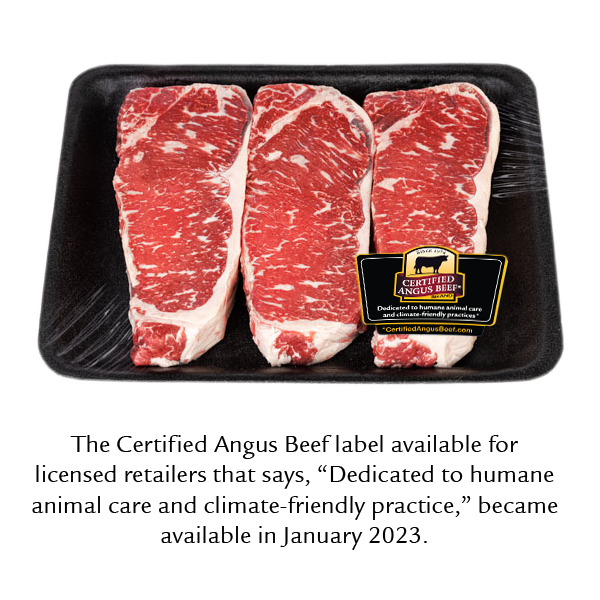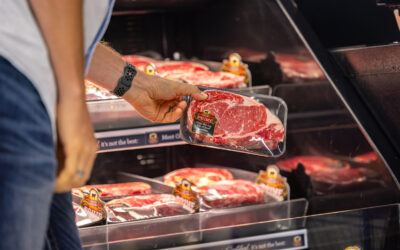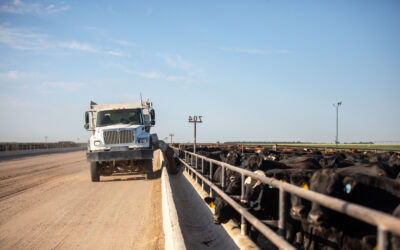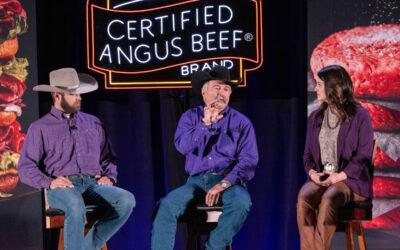
Connecting with Consumers at the Meat Case
Certified Angus Beef creates demand and adds value to the entire beef supply chain.
by Kylee Kohls Sellnow
July 2023
In order for you to receive higher premiums on your cattle, there has to be strong demand at the meat case. Not just any demand, but high-quality beef demand. And as a younger generation of consumers has more buying power in the market, their expectations of quality are expanding.
“Our product has to taste great every time and the consumer has to feel good about what the brand stands for,” said Nicole Erceg, former Certified Angus Beef ® (CAB) communications director. “They seek products they think are good for them, the animal and the planet.”
That’s why CAB is committed to adding value throughout the entire beef supply chain.
Using three core pillars to connect with consumers, CAB is focused on sharing stories and messaging, providing options and creating experiences that bridge back to cattle care, the environment and people.
What Consumers Are Looking For
During a Learning Lounge session at the 2023 National Cattlemen’s Beef Association Trade Show CAB shared how it’s meeting customers’ expectations. Erceg and Kirsten Nickles, Ph.D., CAB animal care and sustainability scientist, shared how the brand is responding to consumer research findings.
When asked about sustainability, animal welfare is the number one consumer concern, Erceg said, followed by the environment.
“The way we reach most consumers is at the meat case,” she said. “So as we think about telling your story, it has to be simple and fit on a package.”
Starting in 2023, retail beef buyers may see the statement “Dedicated to Humane Animal Care and Climate-Friendly Practices” on packaging and marketing of the brand.
“We landed on this statement through consumer research,” Erceg said. “It’s not something that connects with cattlemen; those aren’t words we’d use to describe cattle production. But it is what cattle producers are doing and it resonates with consumers.”
Supporting the statement requires more information on production practices to verify how you’re caring for cattle and managing the land.
Quantifying practices at the ranch is challenging, but accredited certifications like Beef Quality Assurance (BQA) verify producers’ dedication to animal welfare to consumers. That’s why CAB is asking Angus breeders and commercial cattlemen to share their BQA or equivalent certification with the brand.
“It’s doing things like BQA certification, keeping good production records and having a grazing management plan,” Erceg said when speaking about increasing consumers’ trust. “As a food marketer, I can take that information and use it to garner more value for your product.”
If you’re BQA certified and would like to share your certificate with CAB, visit CutTheBull.info.
Taking care of the land provides sustainable resources for cattlemen to raise premium beef year after year. The Working Grasslands Conservation Initiative supports the “climate-friendly” part of the marketing claim by creating a collaboration to measure environmental practices with Ducks Unlimited.
“We are experts of beef,” Nickles said, “and Ducks Unlimited has conservation experts and access to research that quantifies how cattle and grasslands are essential to a healthy ecosystem.”
The initiative supports a voluntary suite of programs for producers in the Northern Great Plains and collects data measuring carbon sequestration, soil health improvements, clean water resource development and biodiversity.
“Consumers trust producers and believe beef can be raised in a way that’s good for the environment,” Nickles said. “This allows us to gather actual metrics in a variety of environments and share it through the supply chain.”
While data is still being collected, initial findings will be released later this year.
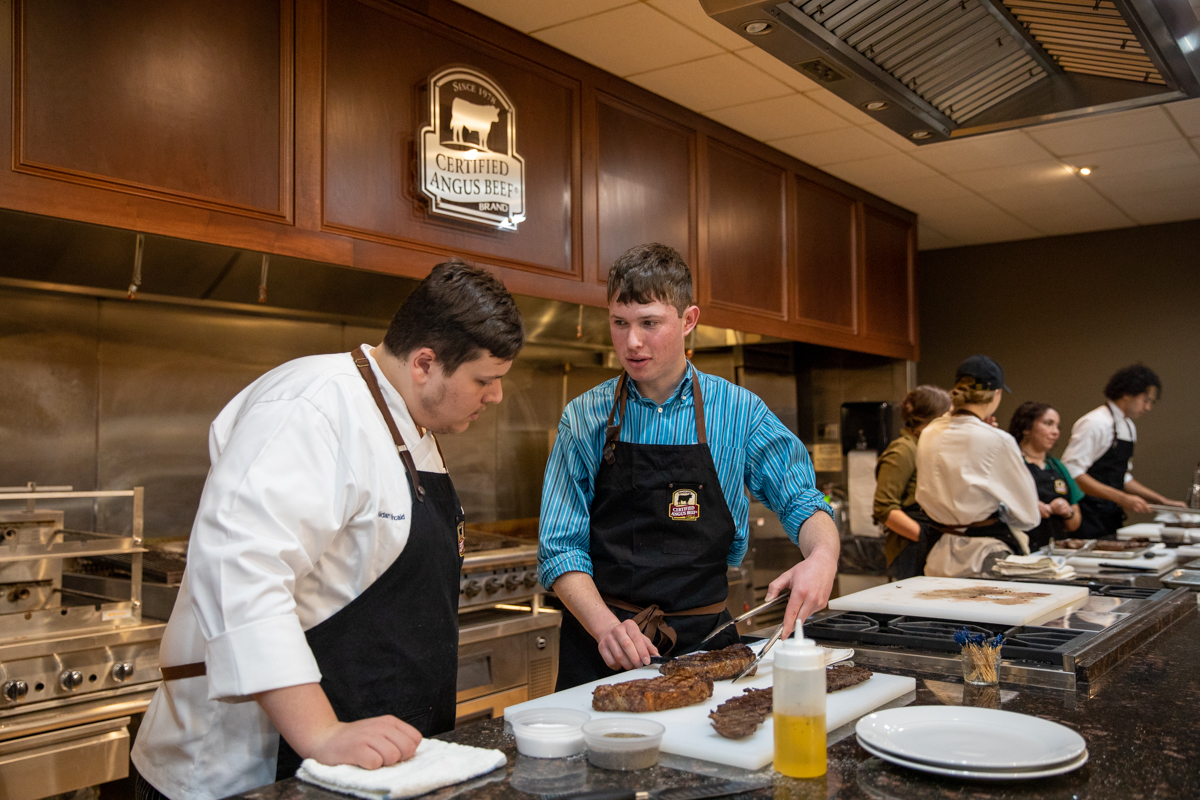
Connecting the Next Generation
A chef and a rancher have more in common than one would assume: long hours, sometimes-grueling environments and a rewarding day’s work.
Five young Angus ranchers gathered alongside five Johnson & Wales culinary students for the inaugural CAB Connecting the Culinarian and Rancher event, where they had the chance to learn from each other, and then break bread together.
“We saw this as an opportunity to bring the young generation of ranchers and the young generation of culinarians together in one space to have conversations about the who, why, what and ‘How can we do this better?’ of both raising cattle and serving beef in a restaurant,” said Ashley Breneman, CAB executive chef. “This also gave these students the chance to establish lifelong relationships at opposite ends of the beef supply chain.”
The day started with introductions and backgrounds of where each of the students got their start and what they are studying in college. Everything from sustainable food systems to livestock genetics, these 10 students brought unique perspectives to the table from around the country.
Johnson & Wales University students attending were Elijah Smith (Rhode Island), Ben Morris (Rhode Island), Aidan Kincaid (New Jersey), Lydon Olivares (California) and Aroura Hammond (North Carolina). Ranchers at the event were Jace Dickerson (Kansas), Mia Encinias (New Mexico), Lauren Gilbert (Missouri), Colter Pohlman (Texas) and Garrett Ulmer (South Carolina).
The students spent the morning at Chippewa Valley Angus Farm, where the young ranchers each discussed topics related to raising cattle. Animal nutrition, Angus breed characteristics and genetic selections, animal care and handling, sustainability and live-cattle marketing gave insight to the culinary students about what it takes to produce a high-quality steak.
“Even though we come from different backgrounds and totally different ends of the country, we all end up having the same end goal,” said Mia Encinias, West Texas A&M animal science student. “As ranchers, our goal is to create the best product possible, but the chefs’ is to serve it. Without one another, we wouldn’t be able to do what we do.”
Chef-rancher teams joined forces at the Certified Angus Beef Culinary Center to cook the perfect steak.
“I was paired up with a young rancher and we cooked our steaks together,” said Aroura Hammond, culinary student. “I utilized techniques that I’ve learned in culinary school, and it was really cool because at the ranch, I didn’t really know anything. Behind the grill and countertop, they didn’t really know anything. The script was flipped.”
After learning more about how great steaks get their start, Hammond shared her goal of keeping guests coming back to her restaurant is a life-long achievement – similar to ranching.
“I think that there are a lot of similarities between us, and the shared passion and love for the product has been really cool to experience,” Hammond said.
Leaving the event with new friends and fresh perspectives, the students took their experiences back to their campuses and family ranches with nimble hands, open minds, big ideas and a newfound responsibility to consider the opposite end of the supply chain when making business decisions down the road.
More importantly, these students learned they will always have a seat at each other’s tables no matter where life takes them.
Creating Demand for the Future
The best beef used to be a great-tasting, consistent steak–and that’s still important–but now we have to deliver more on that product.
While we must meet consumer preferences, it’s driven by the supply chain delivering beef to consumers at grocery stores and restaurants and their sustainability commitments.
Whether you’re marketing Angus bulls or commercial feeder cattle, the more information you can collect on an animal, the wider your customer base is, Erceg said.
“That’s really what we’re trying to do at the brand, look for ways to add value along the chain,” she added. “And producers are at the very beginning and have the most information to share about that calf.”
You may also like
CAB Sets Sales Records, Sees Historically High Brand Acceptance Rates
In an otherwise tough time in the beef business, sales and supply records have been a bright spot. The positive numbers mean that quality beef production has not let up, and beef demand is holding. Consumers have proven the value proposition: the good stuff is worth a little more money, for a better eating experience.
Feeding Quality Forum Dates Set Earlier in August
When you’re feeding cattle, it counts to keep track of every calf, pound and dollar. Beyond the event’s educational sessions, networking between segments of the beef supply chain is invaluable—from feeders and cow-calf operators to allied industry and university researchers.
Gardiners Highlight Service, Strength at Foodservice Leaders Summit
Mark Gardiner and his son, Cole, of Gardiner Angus Ranch offered a boots-on-the-ground perspective for CAB specialists attending the annual event, designed to deliver resources that help train foodservice teams and serve consumers at a higher level.

